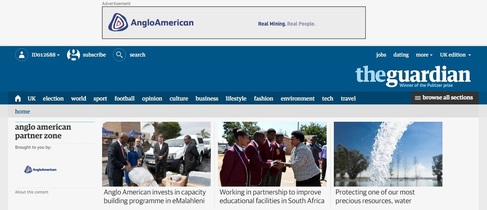The three like-minded men all plan to attend an event in the north of England and they are chatting about it happily until the conversation turns to the route to the venue. Al says that he's been told that the A14-M1 is a far better way to get there than going up the A1. He hasn't tried it himself, but he becomes quite dogmatic when the others disagree.
There's no real reason for the men to quarrel: they are each going to make their own way to the event and the important thing is that they all end up in the same place, not how they do so.
Even so, Al starts attacking the other two, urging everyone in the pub to tell them how misguided they are and that his untested route is the only viable option. Relations become very strained.
Ridiculous scenario, isn't it?
Yet this is what is happening with Alan Rusbridger's valedictory campaign as editor of the Guardian. The central objective of his "Keep it in the Ground" project is not to reduce the mining and use of fossil fuels, but to persuade the Bill and Melinda Gates Foundation and the Wellcome Trust to sell their shares in companies on a list of the "top 200 fossil fuel companies".
The Guardian claims that the Gates foundation has $1.4bn invested in 35 of these companies. The Wellcome Trust has shares in Shell, BP, BHP Billiton and Rio Tinto.
The Gates foundation has declined to respond to the Guardian campaign, beyond saying that investment decisions are taken by a separate trust. Bill Gates's office told the paper: “We respect the passion of advocates for action on climate change, and recognise that there are many views on how best to address it."
The Wellcome Trust was more forthcoming and its director Jeremy Farrar supplied an OpEd piece explaining that it felt it was more helpful to use a shareholder's influence to try to achieve change from within than to sell up. This week Farrar has published a further open letter on the Trust's website saying that the issue is more complex than the campaigners suggest and that the policy of engaging with the companies was showing results:
We have seen no evidence from campaigners that the divestment initiatives that have happened to date have had any comparable influence on any fossil fuel companies. We are being asked to exchange an approach that we know to be effective, if difficult and complex, for another based on conjecture.
In the "Everything you wanted to ask about the campaign" section of the Guardian site, the question of accepting advertising from fossil fuel companies is addressed with a six-year-old quote in which Rusbridger told a panel:
I think it is very dangerous for the editorial department to start interfering with advertising and I certainly wouldn’t welcome it the other way around.
There is no doubt that the Guardian feels strongly about climate change and that its outgoing editor wants to make a difference. But to pick a fight with two hugely respected organisations that are basically on the same side seems an extraordinary approach. Some might even feel that two of the Daily Mail's favourite words in relation to the paper - arrogance and hypocrisy - (see the post below about Snowden) would be well applied in this instance.
Alan Rusbridger is regarded by many as the most distinguished editor of his generation. What a sad way to go.






 RSS Feed
RSS Feed


